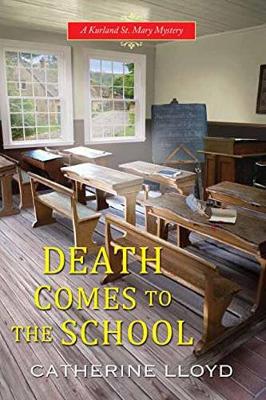
Three years have passed since Major Sir Robert Kurland and Lucy Harrington, the rector's daughter, became husband and wife. Having established a measure of contentment among the gentry of Kurland St. Mary, the couple lately have found an unsettling distance grown between them. But when the small-village peace is disrupted by the arrival of an anonymous letter accusing Lucy of witchcraft, her as yet unfulfilled desire to be a mother becomes the least of her worries, especially after she learns she is not the only one to have received such a malicious letter.
I caught a cold a few weeks ago that I thought I'd kicked to the curb after only 4 days, only to have it come raging back a week later in the form of a cough that will. not. die. I've sounded like a barking seal for the last 8 days and yesterday, to add insult to injury, I got a skull cracking headache, too, leaving me feeling like every time I coughed I was going to end up like those people in the X-files, whose brains exploded out their ears.
So even though I have 3 other books currently going, I needed something very easy on both my brain and my eyes. Death Comes to the School was a perfect fit with it's on-the-large-side-of-average typeface and it's very familiar backdrop and characters. It allowed me to forget for a time about the icepack wrapped around my head and the cough lozenges that have stained my tongue purple (black elderberry).
The story starts off 3 years after the last book; why don't authors of series do this more often? It makes everything that happens so much more believable; rather than have a village of death, you're backdrop is just a village where normal stuff happens. Anyway, the murder happens fairly quickly, to a school teacher nobody liked, and it happens rather oddly, with a hat pin in her neck and a pen in her eye. From this point, the author has a bit of fun twisting the character stereotypes of the time around and using them to her advantage. The mystery plotting of the book is really very good, although the motivation tie-in at the end was a tad weak.
The character angst though, I could have done without. I really like Robert and Lucy, both individually and together but this book ... this book turn them into cardboard cliches, all because Lucy has yet to produce an heir. This is an historically accurate issue; childbirth was a treacherous business and entailments created situations where entire villages depended on one poor woman to produce a son. I get that. But the whole emotional miscommunication thing that bogged down this story was stupid; for two characters that talked and argued about everything incessantly in the first three books, the whole "doesn't she want me?" "he doesn't desire me anymore, I'm a failure" let's-not-talk thing was just annoying.
There was more to like than not, though, and as a nice bonus, the book takes place during Christmas, so it was seasonal too! This has been a solid series so far and I'm already looking forward to the next one, which will undoubtably continue to revolve around heirs and spares, but hopefully without all the silly angst.
Book themes for St. Martin’s Day: Read a book set before the age of electricity.
Reading updates
-
Started reading
-
8 December, 2017:
Finished reading
-
8 December, 2017:
Reviewed
